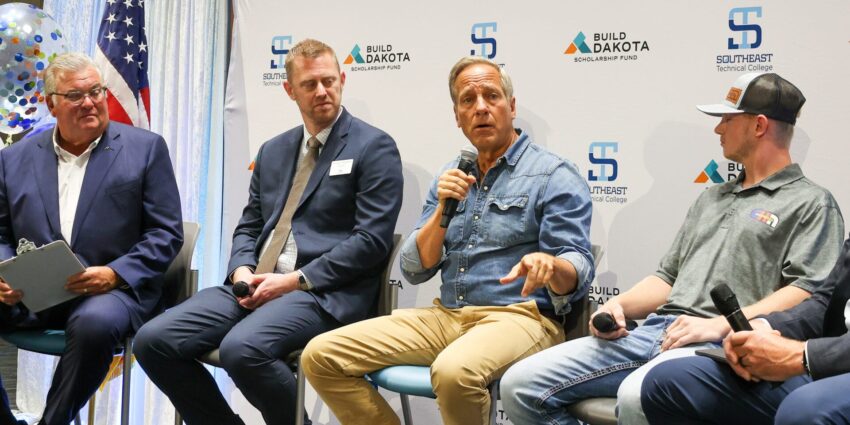Jobs
Dirty Jobs star Mike Rowe: South Dakota ‘crushing it’ with Build Dakota Scholarship

Sept. 26, 2024
By Jonathan Ellis, The Dakota Scout
South Dakota’s push to emphasize the value of trade schools through public-private partnerships is unmatched in the rest of the country, TV personality Mike Rowe told an audience Thursday at Southeast Technical College.
Rowe, the host of “Dirty Jobs,” a show that highlights blue-collar work – including jobs that many people don’t want because they are labor-intensive – said he has toured the country advocating for more people to enter rewarding, and lucrative, careers in various skilled trades. Rowe was in the state to celebrate the 10th year of the Build Dakota Scholarship.
“I’m looking for a place that’s crushing it, and it’s here,” he said. “It’s this state.”
Southeast Technical College was his first stop on a statewide tour of four technical schools to celebrate the scholarship program’s success. Build Dakota started with a $25 million donation from philanthropist and banker T. Denny Sanford in 2014. Then-Gov. Dennis Daugaard convinced the Legislature to match that funding with another $25 million. Scholarship recipients commit to living in the state for three years and practicing the trade for which they were educated.
Through partnerships with more than 500 businesses, the program has provided almost 4,000 scholarships and attracted more than $21 million in matching funds.
Daugaard sat in on Rowe’s “fireside chat” at Southeast.
“I’m very proud of it,” he said. “I’m really excited it’s going so well.”
Dana Dykhouse, CEO of First Premier Bank, moderated the event. It also featured Southeast president Cory Clasemann, Journey Group CEO Randy Knecht and Tyler Lee, a 2024 graduate who received a Mike Rowe scholarship.
Rowe recounted his own journey to advocate for the trades. His father’s formal education didn’t go past the seventh grade, but his father was a master at building and fixing equipment. Rowe said he grew up in a house his father built without blueprints.
He wanted to follow in his father’s footsteps, but he inherited the “regressive gene,” and he didn’t have the innate abilities that his father possessed. He loved the trades but had to admit that he wasn’t good at them. So he started a career in journalism.
While working for CBS in San Francisco, he got a call from his mother. She told him that his grandfather was about to turn 90, and he wanted to see Rowe actually work – a dig at his TV career. Rowe ended up doing a segment on San Francisco sewer workers. The segment was unorthodox.
“What happened was funny and real,” he said.
That gave birth to “Dirty Jobs,” which started in 2003.
Five years later, the United States hit a recession. Rowe said it was obvious to him that the education system had placed too much emphasis on four-year college degrees and the debt they come with. He noted that many high schools had deemphasized learning trades by taking shop classes out of their curriculum.
Clasemann said the Build Dakota scholarship is a “wonderful opportunity” for students to graduate debt-free.
“Ten years later, this is beyond anything we could have imagined,” he said.
Here’s a look at Southeast Tech’s health care simulation opportunities.
Rowe’s next stop Thursday morning was at Lake Area Technical College in Watertown. He was scheduled to make stops in the afternoon at Mitchell Technical College and Western Dakota Technical College in Rapid City.
Lee, who graduated from the HVAC program, said he was able to start work while also going to school. When Rowe asked if he sees a path to making a six-figure income, Lee said, “Yeah, hopefully soon.”
Despite the program’s success, South Dakota’s job market still has room for a lot more graduates in nursing and technical fields. Knecht said Journey easily could hire 25 to 50 trained people and put them to work immediately. The construction company employs 450 people now.
In a previous era, Knecht said the company could put an ad in the paper for a job and get five applications. Now, the company recruits in high schools and even middle schools for future workers.
“There’s a lot of kids who don’t realize they have a path,” he said.
The story is brought to you in partnership with The Dakota Scout, a local news source focused on government and politics. To learn more, click here.










